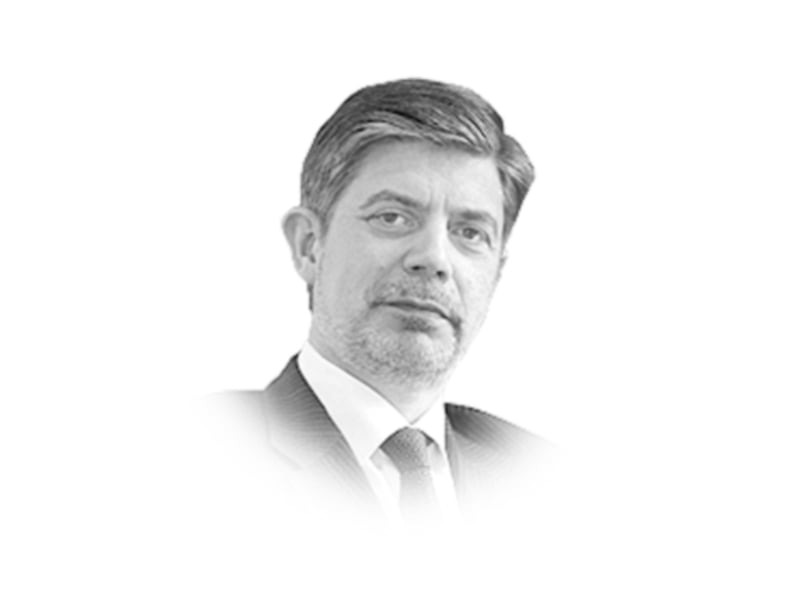
Ms Suu Kyi, who is now the leader of the opposition in Myanmar after years of house arrest and recently announced that she will be running for president in 2015, could only pick up her Sakharov Prize last month, after 19 years. Malala Yousufzai is merely 16-year-old, yet, she has already experienced more than many will during a lifetime. The role thrust on her by history is one of tragedy and hope. The theme of Malala’s quest for the right to education is universal and resonates everywhere, but it is also firmly rooted in the soil and history of Pakistan.
Because it is a Pakistani story, one must listen, respect and try to understand the divergent opinions expressed in Pakistan about Malala, hoping that ultimately, the debate will converge around the all-important future of the youth in this country. Those who absurdly claim that Malala is only a stooge of the West should be reminded that she was already known in Pakistan for her unwavering commitment to education long before reaching international fame. She received a national award in 2011 from the hands of former prime minister Yousaf Raza Gilani. And by writing a blog at the age of 11 to denounce the unprecedented ban on girls’ education in northwestern Swat Valley, Malala emerged as a symbol of resistance while, at the same time, becoming a target for extremists rejecting fundamental human rights and democratic principles.
Through their eloquent arguments in favour of education for girls, Malala and her friends have captured the aspirations of millions of girls and boys and their parents, in Pakistan and beyond. Their struggle for education and freedom of speech demonstrates the resilience and stamina of a country suffering daily from terrorism — just as the Pakistani people as a whole, despite intimidation and threats, bravely cast their vote on May 11, 2013.
Irrespective of gender or social background, the true purpose of education is to allow every one of us to choose our destiny. Nobody should be denied this basic right and access to education for all was defined as a major Millennium Development Goal by the United Nations in 2000. Pakistan has adopted a National Plan of Action to accelerate the achievement of the Millennium Development Goals, including on education for all. And the new government of Prime Minister Nawaz Sharif has recently pledged to double spending on public education from two to four per cent of the overall budget. This is very welcome. But further efforts are needed both at federal and provincial levels.
In its quest for education for all, Pakistan can count on the support of the European Union and its member states as reliable and long-term partners without any hidden agendas. The European Union is already supporting initiatives in Khyber-Pakhtunkhwa and Sindh aimed at increasing access to quality education, fostering progression through school, reducing gender and rural-urban disparities, and improving student learning. We are also working with Pakistan on a major nationwide programme for technical and vocational training.
Our shared goal is to enable all young girls and boys to go to school, to study without fear and to decide their own future. Pakistan is a country rich in inspirational individuals. Malala has shown the way forward towards education for all, not just in Pakistan, but everywhere. The European Parliament is rewarding her for that.
Published in The Express Tribune, November 21st, 2013.
Like Opinion & Editorial on Facebook, follow @ETOpEd on Twitter to receive all updates on all our daily pieces.
COMMENTS (11)
Comments are moderated and generally will be posted if they are on-topic and not abusive.
For more information, please see our Comments FAQ











1735025557-0/Untitled-(96)1735025557-0-270x192.webp)







@Habib ur Rahman: Sir, she is a world ICON now; it is the world at large which needs her because she is original, not indoctrinated, nor confused with cliches and aboved all knows the stregnth of the almighty: Who in this poor world does not want to be near her, feel her and touch her, from the Queen to the powerful Presidents and the common citizens of the world. She will return to swat once she has received and completed her education.
Rex Minor
Malala is a ray of hope and a role model for young girls of Pakistan who aspire for education in the face of threats and intimidation from obscurantists and terrorists. She stood up for the girls' right to education in a backward area of Swat at a very young age of 11, with exemplary courage and determination.
She is an extraordinarily talented and lucky child. Her book indicates that she read great books of literature such as Dostoevsky's Anna Karina, Stephen Hawking's History of Time and books by Charlotte Bronte at the very young age of 11 to 13. She survived a targeted attack on her brain unharmed, although her face was disfigured. Who knows that she is a child of destiny!
Her book indicates that contrary to the mis-perception created by some circles in Pakistan, she is first and foremost a proud pashtun girl belonging to Swat, then a Pakistani and then a champion of girl's right to education in countries where it is needed most.
She is a modest girl who has done nothing to disgrace herself, her family, her culture and her country, Pakistan. She ends her book by saying "My world has changed but I have not". She is the greatest ambassador of Pakistan, projecting a very humane and bright face of Pakistan to the World.
It is good to read the article of the Swedish diplomat who is the head of the European Union delegation on economoic and development programs in Pakistan, about the award of Sacharov prize to Malala Yousafzai. What the ambassador did not mention is that unlike other great people like Mandela and Suu Kyi, Malala is not the dissidant citizen of Pakistan. True, her story is unique and her courage for freedom of thoughts is unique too. The quest of learning and the persuit of education given the unusual circumstnces in the region brought about by the American war on terror, is unmatched in History. I cannot recall any other example, perhaps the ambassador can, when a teenager is crying loud and clear for education when the bombs are being dropped in the region, atrocities committed and people are being imprisoned and tortured and houses being raided in the darkness of night and old and young, women and children being maimed to death.
How can the children have free access to education when they are being droned and their task after the bombing is to search for and collect the remaining parts of the bodies and to put them together where possible before burial. This is the scene which a swiss couple recently described on the German televsion who had spent a considerable period in unusual circumstances. What the ambassador has not said is that the European Union is the largest donor of the development aid in the world, and it also recognises the sovereignty of Pakistan, which unfortunately is being trampled by the man who was awarded the Noble Prize for peace.
Rex Minor
First and foremost thank you and the World at large for helping and acknowledging Malalla's brave efforts. My question to you is where we're you when Malalla as a youngster was raising her voice and that too in the valley of Swat, surrounded day and night by these monsters of ill will.
No one acknowledged her initiative then, It took a bullet in the head for you and your ilk to wake up and start bestowing awards that well... Malalla's biggest award will be eliminating ignorance from Pakistan. For this she and Pakistan need help in both funds and expertise. That you and the international community can provide. Heck start by opening and funding schools in Swat in Malalla's name. While you are at it ask the US to stop violating Pakistan's territorial integrity through drone strikes.
Please accept our sincerest gratitude for honoring Malalla.
Actually the world is lacking of such outstanding and inspirational individuals, with feelings, thought and actions directed to words promoting the good of their fellows, Malala is growing in environment, there her paradigm and personality will develope and make her able to play leading role.
@Realist,
It is sad to see so much for hate for a 16 year old girl. Leave her alone please. Even if she receives a reward or two, or someone says positive things of her, that won't harm anyone. I am proud of Malala but if you are not for some strange and inexplicable at least don't rain on others' parade.
Thank you.
Thank you Naeem for taking out the time to share your thoughts with us. You should, if possible, try to contribute more often to share the perspective of Pakhtuns on issues. Malala indeed is a symbol of hope and courage. She is a role model for so many of our children. No doubt she will continue to succeed in life. And thank you EU too for supporting education programs for kids.
Please just leave Pakistan alone. If you like Malala's ideas so much; incorporate them in your country. She already is a Canadian citizen so you will just be following someone from your civilization anyways.
Thank you for writing such a heart warming and thought provoking article. I am from Mardan and a Pukhtun, Malala has made us very proud , it was amazing to watch this 11 years old child write blogs and express her feeling for education. Please accept my gratitude for choosing and bestowing such a honor on this young girl who went through some very horrific time. By bestowing the European Parliament’s Sakharov Prize for Freedom of Thought to Malala, you have bestowed this prestigious award on her country men and women specially her home town in Swat valley. Thank you for helping the children in K-P, the progress in K-P is the progress of Pakistan.
What the world has done and is doing for Malala is commendable.............but at the same time I read 2.3 million children remain out of school in Blochistan in todays DAWN, and Balochistan has a population of some 12 odd million people ( Pakistans population roughly 200 million). Everyone is aware that stuff like this is the result of bad governance but one is forced to wonder as to why the force that is behind Malala ( and rightly so ) is some how not effective in helping the government in correcting its weaknesses.